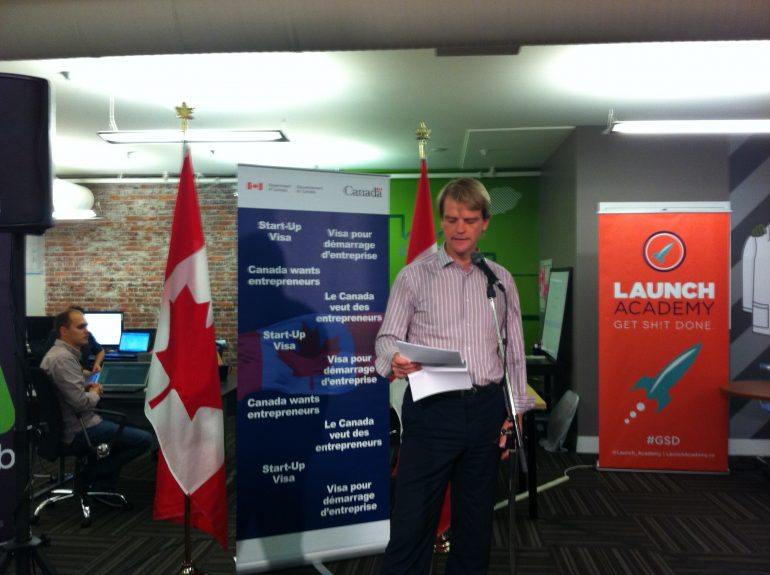Immigration is our story. Immigrant brawn helped settle our Prairies and connect our country with a railroad. Immigrant brains have created companies and jobs. And how the government addresses immigration is as important as ever.
Canada’s Minister of Citizenship and Immigration, Chris Alexander, was in Vancouver Friday using a tour of GrowLab and Launch Academy as the backdrop to a talk about the Startup Visa program.
After conversations about the overall mission and successes for one of Vancouver’s key startup hubs with GrowLab’s Mike Edwards and Charlyne Fothergill and Launch Academy’s Ray Walia, minister Alexander shared his prepared notes.
He highlighted past accomplishments and painted the visionary future of the current government, including a mention of the $400 million Venture Capital Action Plan (VCAP), and was clear that job creation is the core goal for the Startup Visa program. He also acknowledged that the government sees “entrepreneurship and innovation as the key drivers of economic growth.”
While capital is fluid, the movement of talent around the world isn’t. The Startup Visa Program, the first of it’s kind in the world, is designed to make Canada a destination for global entrepreneurs. A big draw to the program is the fact that entrepreneurs are awarded permanent residence with no conditions attached to the success or failure of their business. At least Alexander isn’t viewing the startup landscape through rose coloured glasses by recognizing “while we want them to try their best to make the initial investment work, not all will succeed; this is the way entrepreneurship works.”
Just having an idea isn’t enough the receive a Startup Visa. Entrepreneurs need to secure either $200,000 in funding from an accredited Venture Capital firm, or $75,000 from an accredited Angel Investment group. The program is far from perfect, as is indicative of this list with no Vancouver angel groups listed, and an overall lack of geographic diversity.
It might also be fair asking how much seed and early stage investing is done by some of the VCs represented. Minister Alexander says the list is a work in progress, “ because we need a national organizing principle, we are currently working with National Angel Capital Organization, and Canada’s Venture Capital & Private Equity Association.” He confirms that more funding organizations will be joining the accredited list
The program officially launched April 1 this year, and has yet to issue it’s first Startup Visa. It’s really a work in progress. For instance, Jose Barrios (Co-founder and CEO of Cognilab) sees both the merit of the program, yet is living with the frustration of it. He is from Mexico and had the genesis of his business idea while attending the University of Victoria. Despite already raising over $200,000 including $150,000 from an accredited VC, the other funding does not count towards his ability to qualify for a Startup Visa.
It’s sad, yet laughable that a $25,000 investment from GrowLab doesn’t factor into this equation. As well, due to recent changes the government has made specifically to the status of Mexican citizens coming to Canada, the situation is proving to be potentially even sadder for Barrios as his current Visa expires November 18th. From Barrios perspective, “qualifying should be tied to having an accredited investor lead the financing round. He adds, “raising what we have to date is pretty good for a 4 month old company, and I chose the investment from GrowLab over an identical offer from a Silicon Valley accelerator to build our business right here in BC.”
The Barrios situation certainly proves to be a good discussion starter, as Minister Alexander sat with Howard Donaldson (Partner and CFO at Vanedge Capital) Danny Robinson (Founder/CEO at Perch), Charlyne Fothergill (Landgraff), Ray Walia, Gary Boddington (Fodio), Gordon Walter (Vantec Entrepreneur Fund), and Keith Ippel (Managing Director, Invoke Labs), for a roundtable meeting about the state of the program from the Vancouver perspective.
Highlights from the closed door meeting shared with me suggests that the focus was on the promotion of Startup Visa. How to get the right entrepreneurs to apply and how to communicate with them, especially if they have never been to Canada. Some of the questions discussed are: should they fly out to Canada and meet with these investor groups? If yes, how do they reach out to them? The group also proposed the government help with an outreach initiative, such as sponsoring attendance at international conferences.
Like many startups themselves, the Startup Visa program is a good idea with good intentions. However, successful businesses are not built on good ideas and intentions alone. They are built with great leadership delivering on the promise of a grand vision. This program will be nothing like the mass influx of Ukrainian immigrants who started arriving in 1896 to help settle the Prairies. At best the program will attract more global entrepreneurial talent like Jose Barrios, and more importantly ensure we have the business ecosystem in place to keep them from following the flow of capital in places such a Silicon Valley.




